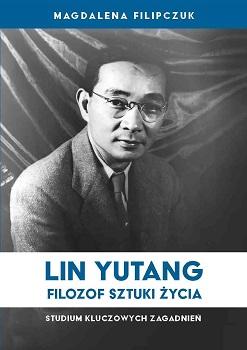Lin Yutang – filozof sztuki życia: Studium kluczowych zagadnień
Słowa kluczowe:
filozofia porównawcza, filozofia chińska, filozofia życia, kultura chińska, filozofia współczesnaStreszczenie
Monografia Lin Yutang – filozof sztuki życia. Studium kluczowych zagadnień prezentuje dorobek Lina Yutanga (1895-1976), chińskiego pisarza, myśliciela, tłumacza, językoznawcy i wynalazcy, ujęty z perspektywy filozoficznej, ze szczególnym uwzględnieniem metodologii współczesnej filozofii porównawczej.
Lin Yutang to przede wszystkim myśliciel i dwujęzyczny autor, wychowany i wykształcony w dwóch kulturach – rodzimej, chińskiej, oraz chrześcijańskiej kulturze anglojęzycznej – który dzięki zdolnościom intelektualnym oraz niezwykłej erudycji stał się łącznikiem między cywilizacją chińską a cywilizacją zachodnią XX wieku, w dosłownym i metaforycznym sensie tłumaczem dzieł kultury chińskiej dla zachodniego odbiorcy. W ciągu długiego życia Lin opublikował ponad 60 książek, z czego 40 tytułów w języku angielskim – tylko siedem z nich to powieści, reszta to dzieła niesfabularyzowane. Lista owych niebeletrystycznych utworów obejmuje m.in. krótsze i dłuższe eseje, opracowania dotyczące starożytnych mędrców chińskich – Konfucjusza, Laoziego czy Zhuangziego – tłumaczenia ich dzieł oraz antologie tekstów filozoficznych i mądrościowych. O popularności Lina w świecie Zachodu zadecydowała wszakże translacja kultury chińskiej na grunt zachodni oraz jego niezwykle cenione utwory literatury pięknej. Po ukazaniu się dwóch książek: My Country My People (1935) oraz The Importance of Living (1937) autor zyskał ogromną sławę jako „chiński filozof”, jednak jego myśl filozoficzna, rozproszona w różnych dziełach, rzadko bywała przedmiotem badań akademickich.
Rozdziały
-
SPIS TREŚCI
-
WPROWADZENIE
-
Stań badań .......... 12
-
Główne założenia pracy i jej konstrukcja .......... 19
-
Źródła finansowania .......... 32
-
ROZDZIAŁ 1. METODOLOGIA BADAŃ FILOZOFII PORÓWNAWCZEJ
-
Widmo europocentryzmu .......... 35
-
Filozofia globalna .......... 39
-
Metodologiczne konteksty badań porównawczych z filozofią chińską w tle .......... 43
-
Wokół porównywania .......... 48
-
Chiny jako modelowy „Inny” .......... 53
-
Światy mentalne .......... 58
-
Swój – obcy .......... 62
-
Kanon .......... 66
-
Lin – tłumacz międzykulturowy .......... 73
-
Niewspółmierność systemów kultury .......... 82
-
Filozofowanie w perspektywie porównawczej .......... 85
-
ROZDZIAŁ 2. LIN YUTANG – KONCEPCJA FILOZOFII I JEJ KONTEKST INTERPRETACYJNY
-
Filozofia życia – ku doświadczaniu i przeżywaniu .......... 92
-
Czy rzeczywiście filozofia życia? .......... 111
-
„Śmiejąc się z Laozim” – krytyka głównego nurtu filozofii zachodniej .......... 115
-
Filozofia w perspektywie terapeutycznej .......... 121
-
„Ja” krytyczne – Chiny .......... 135
-
„Ja” krytyczne – Zachód .......... 141
-
Chiny – konstruowanie sensu .......... 152
-
ROZDZIAŁ 3. LIN YUTANG – MODEL ARTYSTY-FILOZOFA
-
Wyznaczniki filozofii sztuki życia .......... 157
-
Obrazowanie .......... 161
-
Autoportret – gra z konwencją autobiografii .......... 163
-
Kształtować życie, jakby było dziełem sztuki .......... 170
-
Mądrość Konfucjusza .......... 176
-
Wyrazić to, co w nas „oryginalne” .......... 194
-
Satyra na filozofa .......... 207
-
ROZDZIAŁ 4. LIN YUTANG – SZTUKA MYŚLENIA, PISANIA I CZYTANIA
-
Sztuka w codziennym życiu .......... 217
-
Doskonalenie siebie .......... 225
-
Filozofowanie jako konwersacja .......... 232
-
Dan – niewypowiedziane i niewypowiadalne .......... 236
-
Wyrażenia metaforyczne .......... 244
-
ROZDZIAŁ 5. LIN YUTANG – POSZUKIWANIA RELIGIJNE .......... 253
-
Lina definicja religii .......... 257
-
Metaforyczność i poetyckość .......... 258
-
Lina inspiracja daoizmem .......... 261
-
Inspiracja amerykańskim pragmatyzmem .......... 269
-
Synkretyzm religijny i „chiński charakter” .......... 273
-
WNIOSKI
Downloads
Bibliografia





